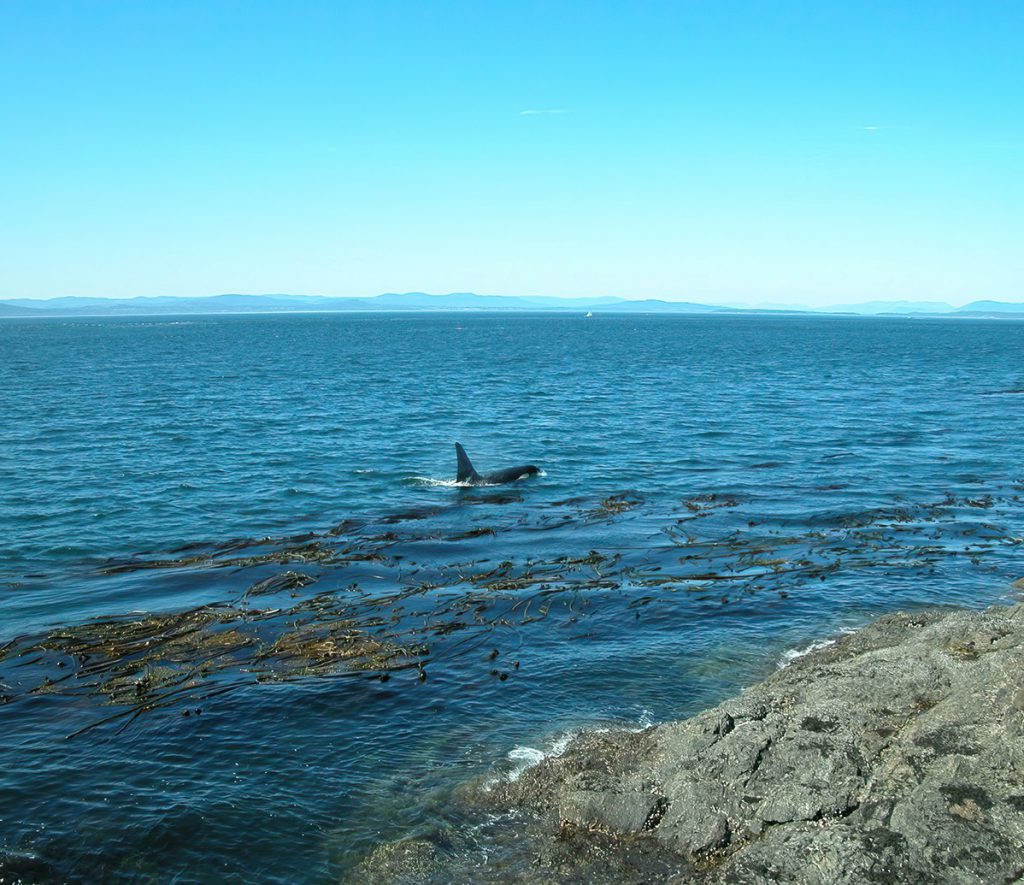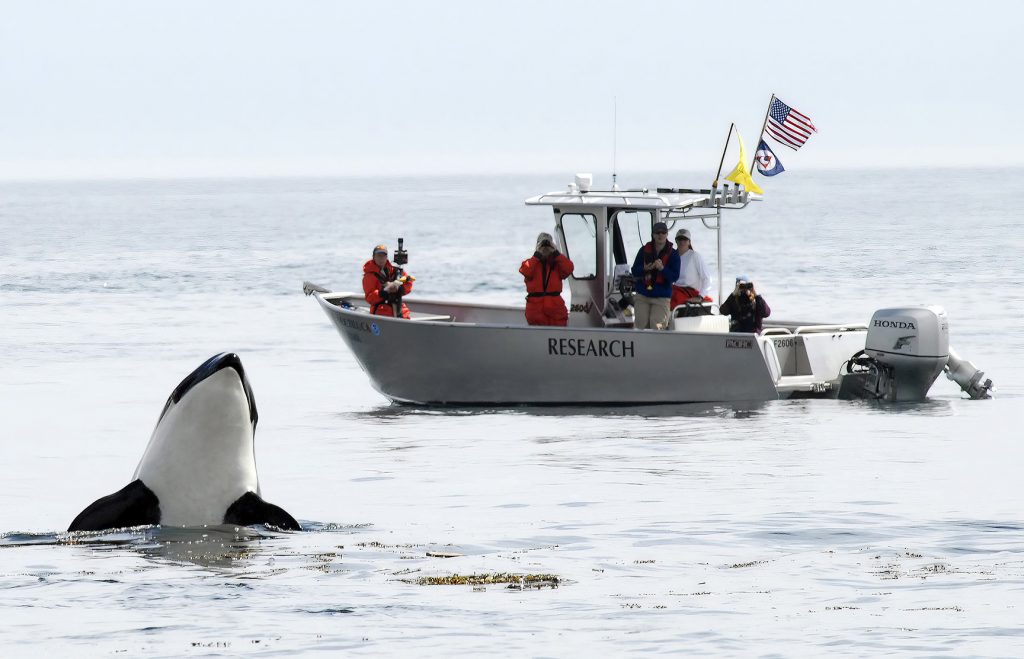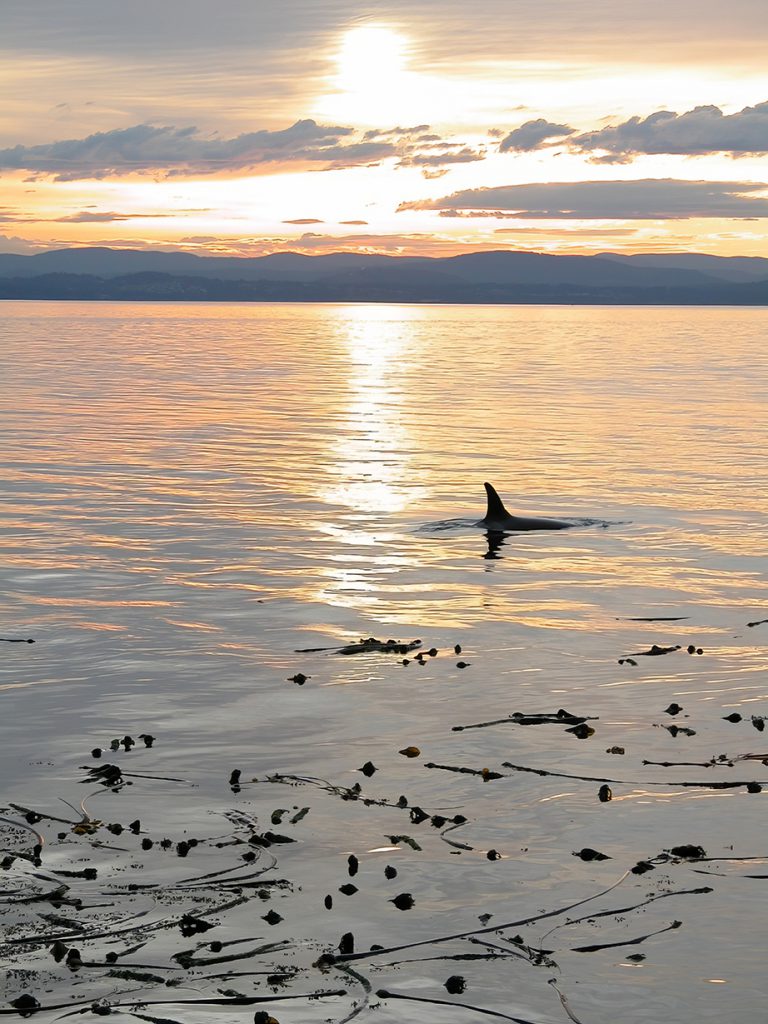The Cetacean Desk’s marine mission for the Southern Resident killer whales.

Deep in the Salish Sea, Southern Resident killer whales scout the dark waters in search of dinner. Today’s menu? Their favorite, Chinook salmon. Meanwhile, just a few short miles away, a large shipping vessel bounds along the sea at 22 knots, its heavy rumbling
sound partially jamming the whale’s sonar and its ability to communicate and hunt for already scarce prey. For us, it’s like an easter egg hunt with the lights dimmed. For the endangered Southern Resident killer whale, it’s a daily reality.
In February, the U.S. Coast Guard unveiled its new whale alert system at their Seattle base, named the Cetacean Desk. A four-year pilot program, hosted in the Puget Sound Vessel Traffic Service, the Cetacean Desk aims to keep whales and maritime vessels apart while also hoping to understand and reduce the effects of vessel traffic on endangered whales within the Salish Sea.
“The opening of the Cetacean Desk introduces a new important way for the Coast Guard to contribute to regional whale protection and recovery as we all work together with a shared vision of reducing the impacts of vessel traffic on local whales,” said Lieutenant Commander Margaret Woodbridge, the Cetacean Desk’s program manager at Coast Guard section Puget Sound during the desk’s unveiling ceremony on February 21.
“As vessel traffic changes, [the Cetacean Desk] is a great way to centralize data and provide an efficient way to get information out to mariners who want to help.”
– Tara Galuska. orca recovery coordinator at the Governor’s Salmon Recovery Office.
The creation of the Cetacean Desk was a collaborative effort between federal, local, and state agencies alongside the Makah Tribe, Port Gamble S’Klallam Tribe, and Lummi Nation. Sen. Maria Cantwell authored the legislation in the Coast Guard Authorization Act of 2022 and signed it into law in December 2022 as part of the National Defense Authorization Act. “[The program] allows the Coast Guard, if you will, to act almost like air traffic controllers,” said Sen. Cantwell during her speech at the ceremony. “The whale
desk will operate 24 hours a day, seven days a week, and will serve as a vital tool for protecting whale populations in Puget Sound.”
While the U.S. Coast Guard may not engage in active vessel management like an air traffic controller does, the desk allows them to receive whale traffic sightings within the area and report the information in real time to the Whale Reporting app. Mariners can
check their app for the updates so their sea vessels can safely avoid whales in their vicinity. Anyone can report whale sightings to the Cetacean Desk by calling its hotline at 206-217-ORCA.
“The sightings that the desk collects can be used to help mariners make safer choices and quiet sounds,” says Rachel Aronson, the program director of Washington Maritime Blue’s Quiet Sound program, an initiative aimed at reducing noise impacts to
Southern Resident killer whales from large commercial vehicles. “They can do things like slow down or take another route, or simply post more eyes up to be more aware as they move forward.”

Real-time whale traffic alerts aren’t the desk’s only purpose either, as it also aims to use the data it collects to help research whale-migration patterns and find ways to reduce vessel noise. Vessel operators, scientists, and the Coast Guard are coming together to share information and data, and Aronson is thrilled about the opportunity the Cetacean Desk provides to collaborate.
“The Cetacean Desk aligns with our regional goals to help endangered whales and ships share the waters of the Salish Sea, and I’m excited about how they may be able to grow their engagement in the system,” said Aronson. “The Coast Guard has been an
advisor to Quiet Sound from the beginning and we’re just really thrilled that they’re taking this step towards engaging in the vessels and cetacean space.”
“The sightings that the desk collects can be used to help mariners make safer choices and quiet sounds,”
– Rachel Aronson, program director of Washington Maritime Blue’s Quiet Sound program.
One of Quiet Sound’s projects involves providing commercial mariners with real-time awareness when they are near whales via the use of a tool called the Whale Report Alert System (WRAS), a tool used by mariners and conservation groups in the U.S. and Canada, which uses the information provided by the reports to the Whale Reporting app.
“One of the ways we do that is by facilitating a system that takes input from people,” said Aronson. “That input goes through technology to collect and process sightings, which goes out to commercial mariners. The Coast Guard’s new Cetacean Desk is now one of those inputs. Their involvement brings formal federal engagement to this system for the first time, which shows what we’re doing isn’t just a scrappy initiative. There are also partners who might feel more comfortable talking to the Coast Guard about where their vessel is and where a whale is, rather than reporting it to an app or through a local sighting network.”
For Tara Galuska, orca recovery coordinator at the Governor’s Salmon Recovery Office, the Cetacean Desk is a long time coming.
“The desk is a real opportunity to expand the network of sighting data and build on the work that has already gone into other whale reporting apps,” said Galuska. “As vessel traffic changes, this is a great way to centralize data and provide an efficient way
to get information out to mariners who want to help. And they do want to help. They want to do something.”

The Cetacean Desk is loosely modeled after the Canadian Coast Guard’s Marine Mammal Desk, and Galuska is excited to have a U.S. equivalent, especially when it comes to providing more opportunities for extra research.
“I’ve seen presentations on [the Marine Mammal Desk’s] sightings, and there’s been a lot of success,” said Galuska. “They’ve been able to determine trends of where whales are at certain times of year and learn more about spatial distribution of all types
of whales.”
One project that has seen success in Canada is the Vancouver Fraser Port Authority’s Enhancing Cetacean Habitat and Observation (ECHO) program, which aims to address and understand the cumulative effects of shipping activities on whales on the southern coast of British Columbia. Krista Trounce is ECHO’s research manager and has been pleased with the success of the program since its inception in 2014. Trounce noted that much of ECHO’s data has been collected with the support of the Government of Canada, which is shared with scientists and policy makers around the world and used to advance research to make ships quieter.
“I think our greatest achievement has been the high levels of voluntary participation by the maritime industry,” said Trounce. “Through voluntary vessel slowdowns and traffic displacement in important areas of Southern Resident killer whale critical habitat, we are making a measurable difference in reducing underwater noise to help support the recovery of this endangered species.
“Programs like ECHO, Quiet Sound, as well as the Marine Mammal Desk and Cetacean Desk, all play an important role in understanding how human activities affect our marine ecosystem. Having transboundary organizations working together and taking a multi-pronged approach to protecting our shared waters will be key to supporting species recovery.”
“With the Cetacean Desk operating 24/7, it’s an incredible resource for oil spills … I see it as a critical piece of functionality that would give responders a sense of where cetaceans are and if they’re approaching a spill.”
-Tara Galuska. orca recovery coordinator at the Governor’s Salmon Recovery Office.
Aronson is excited by the opportunity the desk provides in the research and development of new technologies that decrease the reliance on human sightings, especially during the night and low-visibility weather. Some examples include applying machine learning elements to hear whales via hydrophones and automatic thermal image detection.
“If we’re going to achieve our goal of 24/7 whale sightings, we’re going to need more tools that supplement the times of days and weather situations when humans are on the water,” said Aronson. “There’s potential for the system to grow, such as bringing in
more automated technology that can detect whales with guidance from humans, but not necessarily having a human needed in the system 24/7.”
The Cetacean Desk pilot program will initially be funded for four years, but Aronson, Galuska, and Trounce already hope that the funding extends beyond that period. All three agree that the potential of the Cetacean Desk far surpasses its current scope and can be used in a variety of ways to help Puget Sound, such as providing a more efficient way of responding to oil spills.
“I see it as a critical piece of functionality that would give responders a sense of where cetaceans are and if they’re approaching a spill,” said Galuska. She also lauds its potential in aiding development of deterrent deployment technology such as Oikomi
pipes, which create a noise curtain around oil spills to detract whales from them.
“The response and surveillance could be more immediate,” said Galuska. “It’s a lot of work to coordinate with the natural resource agencies and volunteers, but with the Cetacean Desk operating 24/7, it’s an incredible resource for oil spills. There’s also
opportunity for the desk to coordinate with the incident command system and make sure they’re part of that structure and that there’s awareness.”
“It’s a pilot program, so the desk’s capacities will grow over time,” said Aronson. “I’m excited, and I can’t thank Sen. Cantwell enough for her support.”

